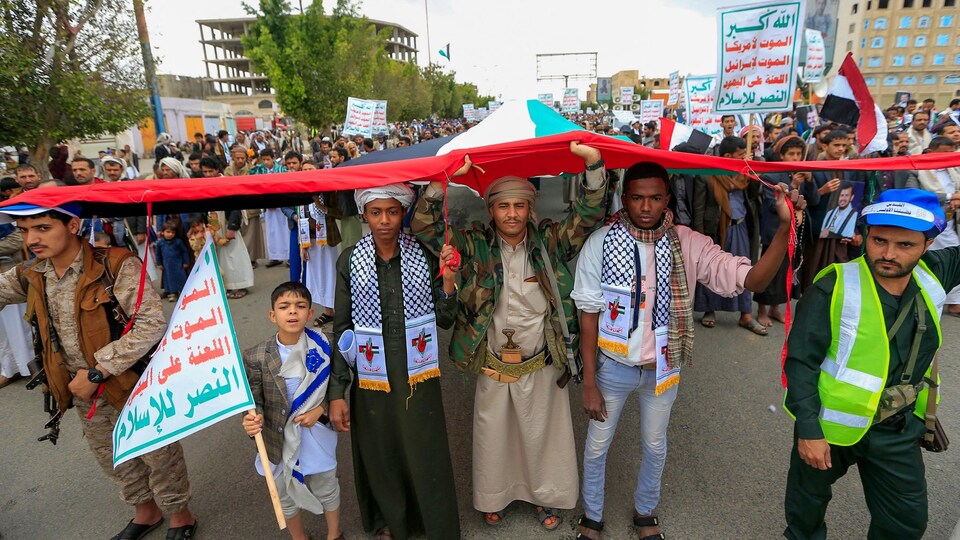A West Bank settlement guard was killed in an attack Friday night and a Palestinian was killed in clashes with Israeli forces north of the occupied territory, after a day of fresh clashes between Palestinian and Israeli police on the esplanade of Mosques in East Jerusalem, after more than a month of violence in the Palestinian Territories and in Israel.
A 20 -year -old guard, assigned to the entrance to Ariel’s northern West Bank settlement, was shot and killed Friday night by two assailants who fled in a car, the official said. Israeli army and emergency services.
The ruling Hamas Islamist movement in the Gaza Strip praised the attack, calling it aheroic operation.
This is part of our people’s response to the attacks on Al-AqsaHamas spokesman Hazem Qassem said in a statement, referring to the recent violence at the Al-Aqsa Mosque compound in East Jerusalem.
Friday saw new clashes at the site, sacred to Muslims and Jews.
The Palestinian Red Crescent Society said 42 Palestinians were injured during clashes with occupying forces22 of them were hospitalized.
A Palestinian was also killed Friday night in clashes with Israeli forces in the northern West Bank, the Palestinian health ministry said.
The old man, in his twenties, was shot in the chest by live ammunition during the Israeli army operation in the locality of Azzoun, the ministry said in a brief message to the press.
A tense Ramadan
Israeli forces entered the esplanade of the Mosques on Friday and used ways to spread the majoritythen troublemakers had threw stones and fired fireworkssome were trying to stone the Wailing Wall, a Jewish shrine below, police said, reporting two arrests.
Police fired rubber bullets at Palestinians and tear gas canisters, witnesses said.
Located in the Old City of East Jerusalem, a Palestinian sector of the holy city occupied and annexed by Israel, the esplanade is the third holiest place in Islam. Its access is controlled by Israeli forces.
It is also the holiest place in Judaism and is known as the Temple Mount.
The clashes lasted for several hours and, in the afternoon, a crowd of believers gathered on the esplanade to pray on the occasion of this last Friday of Ramadan, the month of Muslim fasting. Worshipers waved Palestinian flags and the Islamist movement Hamas, an AFP journalist said.
Over the past two weeks, clashes have left nearly 300 Palestinians injured in and around the esplanade of Mosques.
The violence came in a context of escalation after four attacks in Israel between March 22 and April 7 that left 14 dead, including an Israeli Arab policeman and two Ukrainians. Two of the attacks were carried out in the Tel Aviv area by Palestinians from the West Bank, a Palestinian territory occupied by Israel since 1967.
Following these attacks, the Israeli army conducted several operations in the West Bank, which was plagued by deadly clashes. A total of 26 Palestinians and 3 Israeli Arabs were killed, including the attackers.
Day of Al-Quds
New clashes in Jerusalem also took place on the day of the feast of Day of Al-Quds (Jerusalem in Arabic), launched by Iran at the end of the 1979 Islamic revolution.
Demonstrations took place in Iran, an enemy of Israel, as well as in Iraq, Syria, Yemen and other countries in the region, in solidarity with the Palestinians.
Iran supports the Palestinian resistance, denounces normalization [avec Israël]. What some Arab countries have done is an infidelityIranian Supreme Leader Ali Khamenei said on the occasion, referring to some Arab countries that have normalized their relations with the Jewish state over the past two years.
On Thursday, leaders of the Palestinian armed organizations Hamas and Islamic Jihad, near Iran, staged a rally in a Gaza stadium. defend Jerusalem and the esplanade of the Mosques.
Jerusalem will remain in the midst of battle with the enemy [israélien]Hamas said on Friday, claiming the enemy plans for Judaization, blasphemy and division is doomed to failure.
The deployment of Israeli police forces and the presence on the esplanade during Ramadan of many Jews, who were allowed to visit the area at certain times, but without praying there according to the status quo enforced, was widely noticed by Palestinians and their countries in the region. as an act of teasing.
Israel will not change the status quo on the esplanade of the Mosques, was assured to his head of diplomacy Yaïr Lapid on Sunday, who stressed that police interventions on the esplanade were justified.
Source: Radio-Canada
